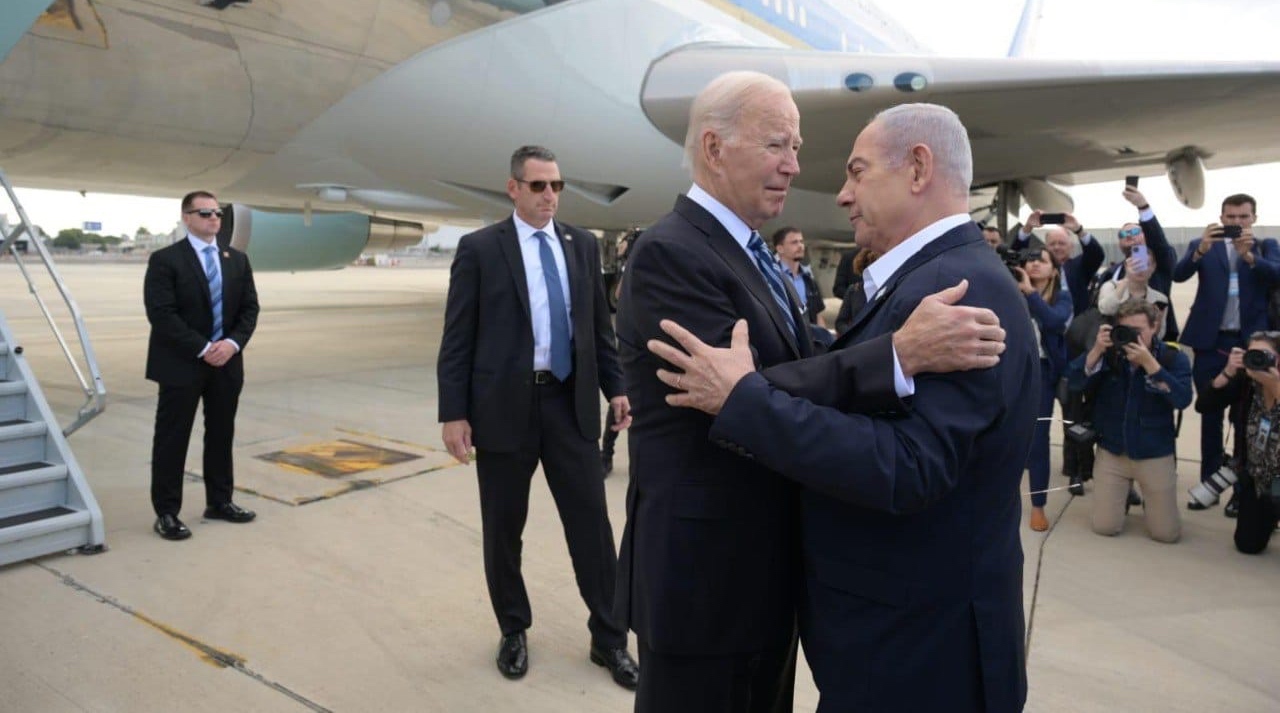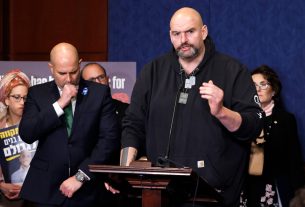WASHINGTON ((JEWISH REVIEW)) — President Joe Biden arrived in Israel with a message of wartime solidarity, saying that he accepted the Israeli assessment that a blast at a Gaza hospital was the fault of Palestinian militant groups.
Speaking to the press in Tel Aviv alongside Israeli Prime Minister Benjamin Netanyahu, Biden said the evidence Israeli officials presented him was persuasive. But he but also indicated that it was not likely to tamp down the eruptions of angry protests across the Arab world.
“The point is, is that I was deeply saddened and outraged by the explosion of the hospital in Gaza yesterday, and based on what I’ve seen, it appears as though it was done by the other team, not you,” he said. “But there’s a lot of people out there not sure, so we’ve got a lot — we’ve got to overcome a lot of things.”
Later, Biden told a member of the White House press pool that the Pentagon had persuaded him. “The data I was shown by my defense department” he said, when asked what made him believe Israel was not responsible.
The Israeli army posted what it said was intercepted audio of Palestinian terrorists, one of whom was explaining that he believed the blast at al-Ahli hospital in Gaza City was caused by a misfired rocket aimed at Israel. The blast reportedly killed hundreds of people, including people who had survived other blasts.
Israel says that the rocket was fired by Palestinian Islamic Jihad, a smaller terrorist group that is at times at odds with the Hamas terror group, which controls Gaza. Hamas and the Palestinian Authority have both publicly blamed Israel.
Before Biden took off from Washington, the spokesman for the National Security Council, John Kirby, said he expected the president and Netanyahu to have difficult conversations. The pair have been at arm’s length all year, since Netanyahu retook power and advanced domestic policies that Biden criticized.
“He’s going to get a sense from the Israelis about the situation on the ground and, more critically, their objectives, their plans, their intentions in the days and weeks ahead,” Kirby said. “And he’ll be asking some tough questions. He’ll be asking them as a friend — as a true friend of Israel. But he will be asking some questions of them.”
Upon arrival, Biden appeared to be only sympathetic, stepping off Air Force One before anyone else and signaling Netanyahu to come forward for a hug. In a later press opportunity with top officials from both countries, Biden sounded a note of solidarity.
“I want you to know you’re not alone,” Biden told Netanyahu at the press opportunity. “You are not alone. As I emphasized earlier, we will continue to have Israel’s back as you work to defend your people will continue to work with you and partners across the region to prevent more tragedy.”
Netanyahu reciprocated the affection. “I have seen your support every day in the depth and breath of cooperation that we have had since the beginning of this war,” Netanyahu said. “A level of cooperation that is truly unprecedented in the history of the great alliance between our two nations.”
Biden had hoped to advance plans for bringing relief to Gaza’s residents as Israel retaliates against Hamas with massive air strikes and plans for a major ground incursion aimed at destroying Hamas. But plans for Biden to meet in Amman, Jordan, with Palestinian Authority President Mahmoud Abbas, Egyptian President Abdel Fattah al-Sisi and Jordanian King Abdullah were scuttled when the Arab leaders pulled out amid sharp domestic anger at Israel over the hospital explosion.
Biden is not just meeting with political leaders during his trip to Israel. Amir Tibon, a journalist with Haaretz whose family’s story of rescue on Oct. 7 has captured international attention, posted a picture of six Israelis who have become local heroes since the attack, saying, “Some Israelis with an interesting story to tell are waiting for President Biden.”
The people include Rachel Edri, who survived after serving cookies to her Hamas captors; Inbal Rabin-Lieberman, who successfully warned residents of her kibbutz in time for them to fend off an attack; and Tibon’s father, Noam Tibon, a retired army general who battled his way south to rescue his son’s family and others when official forces were not able to.



